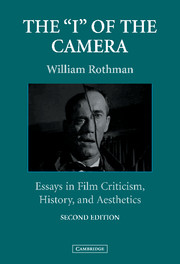Book contents
- Frontmatter
- Contents
- Foreword to the Second Edition
- Preface to the First Edition
- Acknowledgments
- Notes on the Essays
- The “I” of the camera
- 1 Hollywood Reconsidered: Reflections on the Classical American Cinema
- 2 D. W. Griffith and the Birth of the Movies
- 3 Judith of Bethulia
- 4 True Heart Griffith
- 5 The Ending of City Lights
- 6 The Goddess: Reflections on Melodrama East and West
- 7 Red Dust: The Erotic Screen Image
- 8 Virtue and Villainy in the Face of the Camera
- 9 Pathos and Transfiguration in the Face of the Camera: A Reading of Stella Dallas
- 10 Viewing the World in Black and White: Race and the Melodrama of the Unknown Woman
- 11 Howard Hawks and Bringing Up Baby
- 12 The Filmmaker in the Film: Octave and the Rules of Renoir's Game
- 13 Stagecoach and the Quest for Selfhood
- 14 To Have and Have Not Adapted a Film from a Novel
- 15 Hollywood and the Rise of Suburbia
- 16 Nobody's Perfect: Billy Wilder and the Postwar American Cinema
- 17 The River
- 18 Vertigo: The Unknown Woman in Hitchcock
- 19 North by Northwest: Hitchcock's Monument to the Hitchcock Film
- 20 The Villain in Hitchcock: “Does He Look Like a ‘Wrong One’ to You?”
- 21 Thoughts on Hitchcock's Authorship
- 22 Eternal Véritées: Cinema-Vérité and Classical Cinema
- 23 Visconti's Death in Venice
- 24 Alfred Guzzetti's Family Portrait Sittings
- 25 The Taste for Beauty: Eric Rohmer's Writings on Film
- 26 Tale of Winter: Philosophical Thought in the Films of Eric Rohmer
- 27 The “New Latin American Cinema”
- 28 Violence and Film
- 29 What Is American about American Film Study?
- Index
26 - Tale of Winter: Philosophical Thought in the Films of Eric Rohmer
Published online by Cambridge University Press: 05 June 2012
- Frontmatter
- Contents
- Foreword to the Second Edition
- Preface to the First Edition
- Acknowledgments
- Notes on the Essays
- The “I” of the camera
- 1 Hollywood Reconsidered: Reflections on the Classical American Cinema
- 2 D. W. Griffith and the Birth of the Movies
- 3 Judith of Bethulia
- 4 True Heart Griffith
- 5 The Ending of City Lights
- 6 The Goddess: Reflections on Melodrama East and West
- 7 Red Dust: The Erotic Screen Image
- 8 Virtue and Villainy in the Face of the Camera
- 9 Pathos and Transfiguration in the Face of the Camera: A Reading of Stella Dallas
- 10 Viewing the World in Black and White: Race and the Melodrama of the Unknown Woman
- 11 Howard Hawks and Bringing Up Baby
- 12 The Filmmaker in the Film: Octave and the Rules of Renoir's Game
- 13 Stagecoach and the Quest for Selfhood
- 14 To Have and Have Not Adapted a Film from a Novel
- 15 Hollywood and the Rise of Suburbia
- 16 Nobody's Perfect: Billy Wilder and the Postwar American Cinema
- 17 The River
- 18 Vertigo: The Unknown Woman in Hitchcock
- 19 North by Northwest: Hitchcock's Monument to the Hitchcock Film
- 20 The Villain in Hitchcock: “Does He Look Like a ‘Wrong One’ to You?”
- 21 Thoughts on Hitchcock's Authorship
- 22 Eternal Véritées: Cinema-Vérité and Classical Cinema
- 23 Visconti's Death in Venice
- 24 Alfred Guzzetti's Family Portrait Sittings
- 25 The Taste for Beauty: Eric Rohmer's Writings on Film
- 26 Tale of Winter: Philosophical Thought in the Films of Eric Rohmer
- 27 The “New Latin American Cinema”
- 28 Violence and Film
- 29 What Is American about American Film Study?
- Index
Summary
In his long career as a filmmaker, Eric Rohmer has made over thirty films that consistently evidence an interest in philosophy, as exemplified by his 1991 masterpiece Tale of Winter. My modest goal in this essay is to collect a few thoughts about Tale of Winter, all of them exploratory, that relate directly or indirectly to the topic “Philosophical Thought in the Films of Eric Rohmer.”
There was a time when I confessed my taste for Rohmer films only with embarrassment. This was not only because so many of my friends found them boring. (Dwight McDonald once said that viewing a film by Antonioni was like watching paint dry. Some would say this of a Rohmer film, too.) There was also a sense that Rohmer films were ideologically suspect. Rohmer's characters talk a lot, and much of what they say irritated people, or, at least, my friends. Even critics who have cared enough to write about Rohmer's films have found themselves adopting a patronizing tone. And yet it now seems to me a fair wager that history will judge Rohmer, along with Jean-Luc Godard, to be the greatest of the “New Wave” directors.
Before he began making films, Rohmer, a founding editor of Cahiers du cinéma, was a formidable film critic and theorist, very close in his views to those of Andrè Bazin. Rohmer's writings, like Bazin's, continually return to the fact or intuition that film's basis in photography makes it a medium in which reality plays a special role.
- Type
- Chapter
- Information
- The 'I' of the CameraEssays in Film Criticism, History, and Aesthetics, pp. 325 - 339Publisher: Cambridge University PressPrint publication year: 2003



